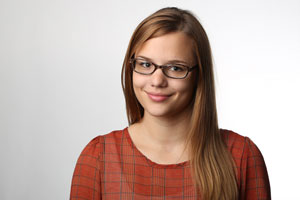Opinion: No room for misogyny in STEM
October 12, 2013
Elaina Sauber
Elaina Sauber is a senior English major and columnist for the Daily Kent Stater. Contact her at [email protected]
As a lover of everything literary and linguistic, my understanding of most things science-related is limited. My mother, on the other hand, lives and breathes science—she’s a practicing OB/GYN with a relentless passion for medicine who finds art in chemistry and comfort in the double-helix of DNA. Yet, I remember several elementary school encounters when teachers or other students learned of the “Dr.” title and immediately assumed it was my father, or tried to correct me and suggest my mother was in fact a nurse, not a doctor.
In 2011, Michelle Obama announced, “If we’re going to out-innovate and out-educate the rest of the world, we’ve got to open doors for everyone. We need all hands on deck, and that means clearing hurdles for women and girls as they navigate careers in science, technology, engineering and math.” While medical sciences are not formally included in the STEM fields, it is important to address the issue women who pursue STEM or physician’s licenses often experience: a culture that is not yet comfortable or familiar with women in these positions. Our lack of presence in STEM is nothing new—at Kent State’s main campus last spring, the College of Applied Engineering,
Sustainability and Technology had 814 men enrolled but just 120 women.
Last week, biologist Danielle N. Lee, a blogger for the Scientific American website for over two years, gained public attention after she wrote a post regarding an exchange she had with an editor from Biology Online, who had first contacted Lee about blogging for them. When she asked for the conditions, he explained that she would receive no financial compensation for her work: “We don’t pay guest bloggers.”
We have 1.6mm (sic) monthly visitors, so by writing and linking to us, you not only receive traffic from us, but it can have a direct effect on the traffic and rank of your blog.” When Lee respectfully declined his offer, he replied, “Because we don’t pay for blog entries? Are you an urban scientist or an urban whore?”
It might be easy to shrug this incident off and reprimand the editor who made these comments. However, in the professional world, as I learned from my mother, misogyny exists, despite the fact that it couldn’t be in a more inappropriate setting. According to Lee, “It wasn’t just that he called me a whore — he juxtaposed it against my professional being: Are you an urban scientist or an urban whore? Completely dismissing me as a scientist, a science communicator (whom he sought for my particular expertise), and someone who could offer something meaningful to his brand. What? Now, I’m so immoral and wrong to inquire about compensation? Plus, it was obvious (to) me that I was supposed to be honored by the request.”
We live in a world that has socially progressed rapidly in the last 100 years—both men and women often criticize the female struggle for equality today, as if it is something we achieved long ago. But if we are truly going to make our mark on the STEM fields, every experience like Lee’s must be addressed, and those responsible for them must be held accountable. Misogyny should not deter us from pursuing our goals.












